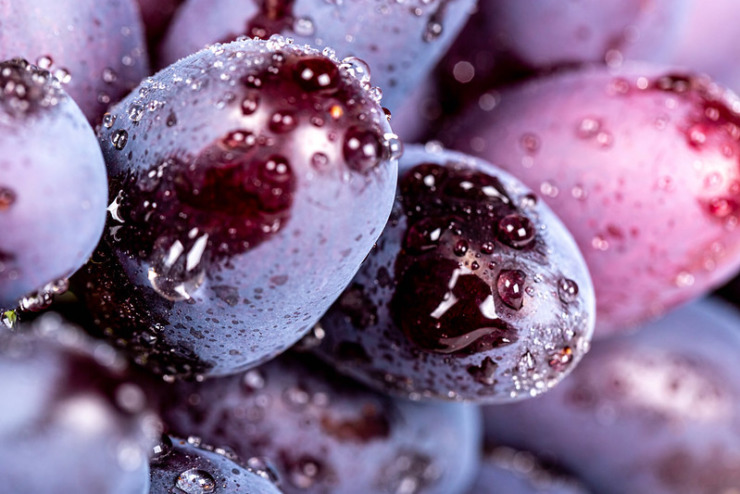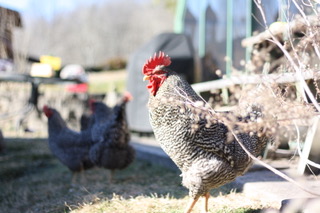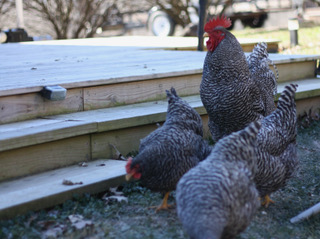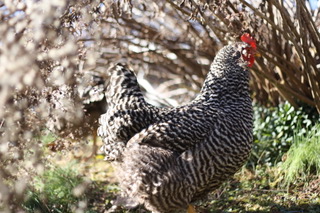
“I’m meeting Tammy at Meg and Jerrie’s to read Shakespeare to their chickens.”
My husband gave me that look. You know the one. One eyebrow raised, head slightly cocked. The I’m not even gonna ask look. The you’re kidding me, right? look. The I should be surprised but I know you too well look.
I smiled. “I won’t be gone long.”
I packed up the stack of egg cartons I’d been collecting, checked my list of curated sonnets on my phone, grabbed a mask and some fruit (“They like grapes,” Meg told me) and hopped in the car. It was the coldest day of the year so far, and I was snug in my puffy coat and a knit toboggan—which I thought a good stand-in for a poet’s beret.
When I told my friend Tammy I was working on a project that involved reading poetry to chickens, she didn’t give me any strange looks. Okay, maybe a bit of a side eye. But mostly a grin and a nod. Then she encouraged me to reach out to Meg, her firstborn. Meg has been staying with Jerrie, Tammy’s mom and Meg’s grandmother, since early in the pandemic. As a pandemic project, they decided to acquire some Plymouth Rock Hens, along with a couple roosters, and build a small coop. The project seemed to be going well and when I told Meg about my own project, I was delighted that it was met with mild enthusiasm.

The first Poet Laura chose Emily Dickinson for her poultry poetry read—a superb choice. As I pondered, I remembered an article I’d read awhile back about a British theater troupe that performed portions of “The Merry Wives of Windsor” to a herd of dairy cows grazing nearby. The article reported the performance led to a four percent increase in the cows’ milk production. Curious, I googled around about egg production. I found articles citing classical music as contributing to faster growth in chickens, increasing their egg production and increasing egg size. But I could find nothing about the effects of reading poetry to chickens. If it works for cows, I thought, why not chickens?
Shakespeare for the win.
Tammy and I arrived in tandem and were met at the door by Carmella, the family dog. Meg ushered us in out of the cold and Jerrie greeted us warmly. “What’s this about reading to the chickens?” She asked, smiling.

Chickens at Meg and Jerrie’s enjoying the sonnets
I explained that it all started as a play on National Poetry Month, only Tweetspeak celebrated National Poultry Month by sharing poems about chickens. And as Tweetspeak’s Poet Laura, reading poems to chickens and writing about it is part of my job description.
Everyone chuckled and a memory of shared conversation rose like a lump in my throat. Standing limp in the living room, appropriate space between us, there was a strange familiarity in that togetherness, but also an undercurrent of anxiety. I kept my mask secured over my nose and mouth, aware that I was the interloper on this family of three generations whose breath mingles on a regular basis. Tammy and I have been friends for almost thirty years, a side effect of marrying our husbands, who have been friends since Junior High. Meg was born just a few months before my own first child, so the two of them have been friends since in utero. And Jerrie is a fellow writer who I was once in a writers’ group with. Each of these people have their own particular claim on my heart.

Chickens at Meg and Jerrie’s enjoying the sonnets
My breath felt less dangerous when Tammy, Meg and I moved outside where the chickens had free range of the yard. I counted four hens and two roosters, all moving as one across the lawn. I tried to get close (to pet one?), but the hens nervously clucked away from me when I drew near.
Fear not. I had the bag of grapes. That was all it took to captivate my audience.
Soon, the chickens were queued up as if they’d paid a penny to stand in The Globe’s uncovered yard. I had them eating out of my hand (literally). The hens clustered by the deck and I began my serenade. The roosters lingered, one in particular (“That’s J.J.” Meg told me. “He’s friendly.”) eyeing me suspiciously and standing guard over his ladies. Tweetspeak has a host of Shakespeare resources, including an article on the top ten Shakespearean sonnets, but I decided to begin with “Sonnet I,” as it seemed appropriate to our cause.
Sonnet I
From fairest creatures we desire increase,
That thereby beauty’s rose might never die,
But as the riper should by time decease,
His tender heir might bear his memory:
But thou, contracted to thine own bright eyes,
Feed’st thy light’st flame with self-substantial fuel,
Making a famine where abundance lies,
Thyself thy foe, to thy sweet self too cruel.
Thou that art now the world’s fresh ornament
And only herald to the gaudy spring,
Within thine own bud buriest thy content
And, tender churl, makest waste in niggarding.
Pity the world, or else this glutton be,
To eat the world’s due, by the grave and thee.
The initial reading went well, considering I was competing with J.J.’s crows (and affections). But even J.J. couldn’t resist a grape or two. Next, I read “Sonnet XV,” which created little stir, so I quickly moved on to woo a singular hen with the famous “Sonnet XVIII.”
Sonnet XVIII (18)
Shall I compare thee to a summer’s day?
Thou art more lovely and more temperate:
Rough winds do shake the darling buds of May,
And summer’s lease hath all too short a date:
Sometime too hot the eye of heaven shines,
And often is his gold complexion dimm’d;
And every fair from fair sometime declines,
By chance or nature’s changing course untrimm’d;
But thy eternal summer shall not fade
Nor lose possession of that fair thou owest;
Nor shall Death brag thou wander’st in his shade,
When in eternal lines to time thou growest:
So long as men can breathe or eyes can see,
So long lives this and this gives life to thee.
The hen, who shall remain nameless, (“I can’t tell the hens apart,” Meg told me, apologetically. Indeed, they all looked identical to me.) seemed flattered by my attentions. But I rather think she was simply enjoying being cradled in the warmth of their arms. Regardless, the hen rejected my token of affection following the whole affair, refusing the plump grape offered in gratitude.
I ended the Bard’s poetry slam with “Sonnet VXXXII” (87), bidding the girls adieu in style.

Chickens at Meg and Jerrie’s enjoying the sonnets
I don’t know if the chickens enjoyed the sonnets, but after the reading, I joined everyone inside to shake off the chill, mask secured. Jerrie made some coffee and put out some cheeses and canned bread. She caught me up on some of our mutual writer friends and Meg gave us a short lecture on the history of the sonnet. Their passion warmed us and I kept catching Tammy’s eye, proud. It was a cozy place to be on a cold day. Still, feeling the weight of my breath, I did not linger long. As I drove away it struck me that this day of reading poetry with the hens (and roosters) may just have been the most normal day I’ve had in a long, long time.
I’ll have to check back to see if the girls’ egg production increases. If not, maybe we’ll try some villanelles. Later, Meg sent me this sonnet:
sonnet for laying hens
condense the faith you roosted
into flesh, discrete and breathing
like a river rock beneath the melt;
an eddy, thrown by spring, and hardly felt:
unconscious alchemy, your body’s use
into my body’s sustentance. i eat you
piece by piece, a dawnlight robbery.
unwanted ends for you–
for me, your progeny.
i husband you into a standing wave,
your very flesh beholden to my mouth.
i raised you in my palm. my voice,
new-made, i gave you, shelled and sweet:
it is no strange thing. all i love, i eat.
—Meg Coppala
Read more from Tweetspeak’s Poet Laura
Browse more Shakespeare
Discover more about sonnets
Learn more about National Poultry Month
Read poems for and about chickens
Photo by Marco Verch Professional, Creative Commons license via Flickr. Post by Laura Boggess. “sonnet for laying hens” by Meg Coppala, used with permission.
__________________________
A Novella From Laura Boggess
Lyrical and whimsical writer Laura Boggess brings us an inspiring story of one woman’s quest to put her life back together. Poetry plays a part. But not before a book gets delivered to the wrong house on a windy, impossible day.
BUY WAITING FOR NERUDA’S MEMOIRS NOW
- Year of the Monarch—A Visit to Craik-Patton House - September 18, 2024
- Year of the Monarch: Butterfly Dreams - March 20, 2024
- Year of the Monarch: Harvesting and Planting Milkweed Seeds - November 15, 2023

L.L. Barkat says
Laura!
I laughed and laughed and laughed again, reading this. I do believe you have a humorous writing side that deserves to get out into the fresh air more often (and be fed a few prime grapes). 🙂
This was so, so fun. And thoughtful, too.
Tell Meg that their poem is wonderful. What a gift!
laura says
A psychologist and a chicken walk into a bar. Hilarity ensues.
I had so much fun during my time with the chickens! And spending a morning with my friends was bonus. We all needed some levity, I think. I’m glad you felt it too.